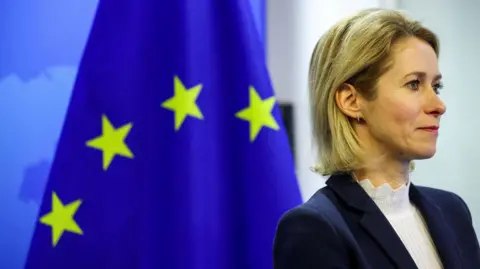EU foreign policy chief says defence spending must rise
 Reuters
ReutersThe European Union's member states need to increase defence spending to keep pace with the threats facing the continent, its foreign policy chief has warned.
Kaja Kallas, who served as prime minister of Estonia until July 2024, said "every euro spent on school, healthcare and welfare [was] vulnerable" if the bloc didn't maintain strong defences.
US President Donald Trump was right to criticise Europe's spending, which sits at an average of 1.9%, she added.
She also pointed to Russia spending 9% of its gross domestic product (GDP) on defence and said Europe's expenditure was "clearly not enough" in light of the war in Ukraine.
"To prevent the war, we need to spend more, that is clear," she told the BBC World Service's Weekend programme.
Kallas said member states also needed to work together to "pressure" Russia economically, and hinted at a new sanctions package next month to mark three years of the war in Ukraine.
The EU needs to be "creative" in terms of limiting Russia's "ability to wage this war", she said, adding that pressuring Russian President Vladimir Putin "is the way to end this war because Putin is the one who started it".
Before taking up the EU post last December, Kallas repeatedly called for higher levels of defence spending while she was serving as Estonia's first female prime minister.
In February 2024, she said she wanted Nato countries to increase defence spending to 3% of their GDP.
Alliance members committed to spending at least 2% of GDP on defence after Russian forces seized Ukraine's southern peninsula of Crimea and Moscow-backed proxies took control large areas of eastern Ukraine in 2014.
As Estonian prime minister, Kallas pledged more than 1% of the country's GDP to Kyiv to help bolster Ukraine's war effort.
"If every Nato country did this, Ukraine would win," she told the BBC last year.
According to Nato estimates for 2024, Estonia's defence spending as a proportion of GDP was the second highest in the military alliance.
In December 2024, Nato Secretary-General Mark Rutte said member states would have to "shift to a wartime mindset" and spend "considerably more than 2%" on defence.
During his first term, US President Donald Trump put pressure on Nato members to increase defence spending and later called for a commitment to meet 4% of GDP.
Shortly before his second inauguration in January, Trump urged Nato's European members to spend 5%, telling reporters: "They can all afford it."
When asked whether she saw the war concluding in Ukraine's favour, Kallas said that was "absolutely" still alive in her mind.
"I don't see any other option really. I mean, if we let the brutal aggression flourish, then we will see this in other parts of the world," she added.
She said: "All the aggressors or would-be aggressors in the world are clearly taking notes how we react to Russia's aggression."
